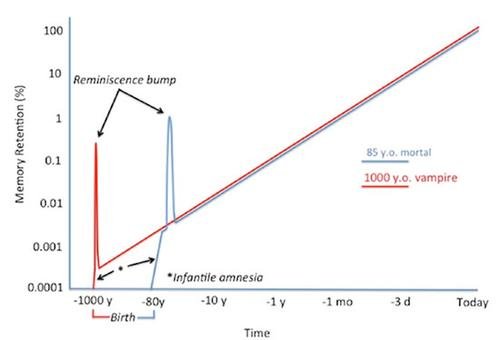I (the author, the same below) watched Jim Jarmusch's movie for the first time 30 years ago. It was at the Detroit Cinema in the Detroit Museum of Art-a very famous independent movie theater. Therefore, when I saw the story of Jim Jarmusch's latest movie "Only Love Eternal Life" starring Tom Hiddleston and Tilda Swinton, it took place in the Motor City, and I felt that it couldn't be better.
Since this movie is about vampires living in the cities I have stayed in, I can't help but start thinking about what we can learn about memory from vampires. For theorists who study memory, vampires have two interesting characteristics. First of all, as long as they are not hit by the mob, they are immortal, so they can accumulate infinite life experience. Secondly, they will not age. This is interesting because for life, the damage to memory caused by the passage of time is always inseparable from the aging of brain tissue and functions. For vampires, the effect of the passage of time on memory has nothing to do with aging.
I must admit that I didn't even find a vampire willing to come to the laboratory for testing, but although there is no specific data, I still want to speculate on how our lovely vampire neighbors dealt with the memory of specific events. First look at the matter of immortality .
Adam and Eve played by Tom Hiddleston and Tilda Swinton in Jim Jarmusch's movie "Only Love Lives"
Episodic memory
If you live forever, will you remember everything that happened? The answer is no. Memory will decay over time. In the figure below, the horizontal axis represents time, and the far right represents the present, extending to the left to the past. Logarithmic coordinates are used here, so the time density on the coordinate axis is getting bigger and bigger. The vertical axis identifies the percentage of events that can be recalled at each moment, and is also plotted in logarithmic coordinates. Although everyone can remember most of the things that happened that day, most people can only remember 10% of the things after three days. We can only remember 1% after a month, and only 0.1% after a year...
With a few exceptions, this function is basically monotonic, which means that the longer the interval, the higher the forgetting rate. An 85-year-old can only remember a little (about 0.003%) of things from elementary school. For a 1000-year-old vampire, this value is 0.0002%. This is not necessarily a bad thing, because forgetting is a normal process for forming new memories. As the psychologist Théodule-Armand Ribot said in 1882, “Only by completely erasing a large number of states of consciousness and temporarily suppressing more of the remaining consciousness can memories be reproduced.” Whether for humans or vampires, and The most relevant memories in life (such as where you parked your car or where there is fresh blood) are the most recent ones.
The first exception to this monotonic function is infancy, from birth to about 4 years old. Memories of this period of time cannot be retained until adulthood. The second exception is the "memory peak area", which refers to the period around 20 years old. What happened during this time and the culture and social environment around each person will be combined to form each person's personality. Therefore, people will remember the experience of this period very clearly.
What happened in the "memory peak area" can be firmly remembered because they are important to the individual and are emotional. People will continue to recall these memories and savor them in their minds, which makes their place in our lives more and more important. Vampires must have been young too, so they should have their own "memory peak area." Even for a vampire, the memory of the first kiss is unlikely to dissipate after 1,000 years. Therefore, just like humans, the memory of the time when vampires were just adults should also occupy a special place in their minds.
The 85-year-old (blue line) and the 1,000-year-old vampire (red line) can each recall what percentage of the past. The horizontal axis identifies the time from the past to the present, expressed in logarithmic coordinates. The ordinate is the percentage that can be recalled when recalling past events. The figure shows that all events that happened that day can be remembered, but only 10% of events three days ago can be remembered, and only 1% of events a month ago can be remembered. The change of the function in each time period is fixed, except for childhood memory loss (from birth to about 4 years old) (so the curve slope is very large for a period of time after birth), and the "memory peak area" (10 to 30 years old) the memory of this period will be clearer (because the experience of this period is related to the formation of personality, is new and has a significant emotional color). Vampires and humans should have similar memory curves, so when a vampire has lived 920 years longer than humans, his memory of that year should be much weaker.
This picture just shows how many events can be remembered, so how clear or vivid are these memories? In 2002, my research team found that as we age, the details of the scene (that is a shiny red Mustang) that humans can recall will become less and less, but comments on events (such as "The Mustang is now It's not as manufactured as it used to be") but more and more. This phenomenon may be related to the decline in people's ability to suppress non-task-related thoughts. Although vampires' memories of the details of the event will fade over time, the stories they tell (such as Adam's memory of Lord Byron in "Only Love Eternal Life") will be clear and concise.
Non-episodic memory
Memory about skills, habits, and professional abilities is different from episodic memory and does not decline over time. However, if faced with the problem of improving self-ability, the inevitability of death still forces people to make some choices. Although I really want to learn a new language or make a beautiful tempura, my life is limited and I have other things that are more important to learn.
Vampires can only appear at night, but they have a lot of time to use. Although the limited life of human beings allows us to focus on improving our current life and reproducing offspring, we pay less attention to long-term goals. But this problem does not appear in vampires. Although some vampires squander their lives (there is an example in "Only Love Eternal Life"), vampires are usually well-educated and even a little arrogant. They can talk and laugh in any conversation. In "Only Love Eternal Life", Eve puts several books in different languages in his luggage when packing.
Eve, played by TildaSwinton, packs books for the trip
Human knowledge and wisdom will increase with old age, but the speed of action and physical ability will decline, so people will have the emotion of wasting time in their youth. For vampires, there is no theoretical limit to the number of skills they can master (except for outdoor activities in the sun or using mirrors). Vampires can have both fish and bear paws, and they can be full Wisdom is also agile at the same time, but humans cannot have both at the same time. How to maintain these learned skills may be the only problem for vampires. If I have not practiced often since I learned the piano in the Elizabethan era, I might not know how to play it now. Here are some suggestions from cognitive neuroscience research. If you are a vampire and want to improve your self-cultivation as much as possible, this is worth reading:
1. Pick two or three skills from different categories, such as sports skills, artistic talents, and intellectual pursuits (such as playing pool, banjo, and Greek literature). The diversity of these learning tasks can keep you motivated and can also produce training-induced neuroplasticity by enhancing the complementary systems of the brain.
2. Intermittent exercises are better than concentrated training, so spread your study plan to several days and leave one to two days to rest before learning the same skill again.
3. Set aside one or two days a week to review and consolidate what you have learned.
4. Get a good night's sleep, because sleep is very important to the solidification of skills.
5. Finally, learn those skills that have been useful. If you learned about weaving tassels in the 70s because they were very popular, you must regret it now.
There are about 100 billion neurons and 100 trillion connections in the brain. At least with current human technology, its complexity surpasses our understanding. As long as there is enough time, there is almost no upper limit to the information that can be absorbed by the brain through neuroplasticity. However, although humans can get more information the more they experience, but the decline of brain function that comes with aging makes this impractical. Although vampires have the same forgetting curve as humans, they still show us how amazing the brain's learning ability and memory capacity are when it is not limited by aging.


